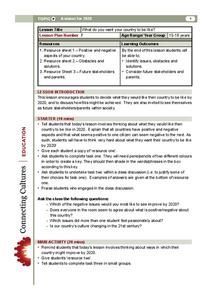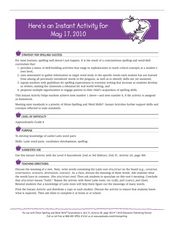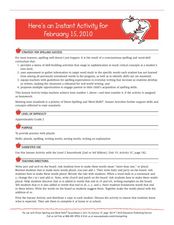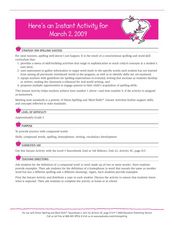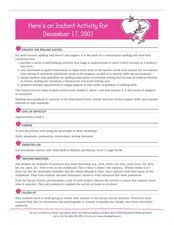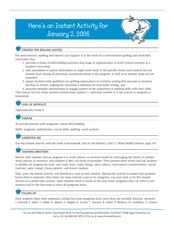ReadWriteThink
A Picture's Worth a Thousand Words: From Image to Detailed Narrative
A picture's worth a thousand words—and even more inspiration! A visual activity uses photographs to inspire writers. The process teaches aspects of narrative writing, such as point of view and characterization.
EngageNY
Interpreting, Integrating, and Sharing Information about DDT: Using Cascading Consequences and Fishbowl Protocol
What is your interpretation? Scholars look at their Cascading Consequences Charts and interpret the information they have gathered. Learners match claims with evidence and then watch a video. At the end, they carry out a fishbowl...
Academy of American Poets
Teach This Poem: “As I Walk These Broad Majestic Days” by Walt Whitman
Walt Whitman's poem "As I Walk These Broad Majestic Days" offers scholars an opportunity to practice their noticing skills. They first examine a postcard of the Newport News Shipyard listing things they notice about the image and how...
University of the Desert
What Do You Want Your Country to be Like?
How would you like your country to be by 2020? What issues do you feel are most important, and how do those compare with your peers? Learners tackle questions regarding the evolving national and global culture of the twenty-first century...
US Institute of Peace
Perspectives on Peace
Much like a garden, once the seeds of peace are planted, they need to be tended! How can humankind make and keep peace? The second installment in a series of 15 peacebuilding activities focuses on different perceptions of peace. The...
ESL Kid Stuff
Adverbs
Run quickly. Walk slowly. Jump high. As part of their study of English parts of speech, language learners engage in a series of activities designed to introduce them to the descriptive power of adverbs.
Curated OER
Night: Unsent Letters Writing Strategy
As part of their study of Elie Wiesel's Night, individuals assume the voice of an Auschwitz survivor and craft a letter to a former SS officer who worked at the camp and claims he is not guilty of any crime.
Curated OER
Acid Rain
Create a simulation of acid rain in your classroom with lemon juice and bean plants to help kids study the effects of pollution on plants. In addition, learners will listen to a story and write responses based on guiding questions.
University of Hawaiʻi
Taxonomy and Me!
Taxonomy is the study of organisms and how you phylum. Three biology activities are included, helping scholars understand four of the six kingdoms, specifically Protista, Plantae, Fungi, and Animalia. Scholars observe and classify in...
US Institute of Peace
Maintaining Trusting Relationships
What role does trust play in diffusing a tense situation? Young social scientists explore trust on a personal and global level during a lesson on peace and conflict. After participating in a trust sit, participants work in groups to...
K20 LEARN
Growing Themes
The theme of a work is not a single word! Rather it is a statement that reflects what a writer believes or wants readers to understand about a topic or subject. Here's a short, but powerful instructional activity that utilizes passages...
Brigham Young University
Out of the Dust: Guided Imagery
A guided imagery exercise is a great way to get readers thinking about writing. As part of their study of Out of the Dust, Karen Hesse’s 1998 Newbery Medal winning verse novel, class members listen to a reading of one of the poems from...
Nemours KidsHealth
Food Safety: Grades 9-12
Food poisoning, salmonellosis, E. Coli, shigellosis, tapeworms—all these words can strike fear into eaters. Alas, the five-second rule is not necessarily true! Two activities teach teens safety rules for food purchasing, preparation,...
Curated OER
Wildwood Dancing: K-W-H-L Reading Strategy On Prejudice
As part of a study of Juliet Marillier's Wildwood Dancing, class members create a KWHL chart listing what they know, what the want to know, how they will find information, and what they have learned about prejudice.
Curated OER
Out of the Dust: Biopoem
As part of their study of Out of the Dust, readers create a biopoem for one of the characters in Karen Hesse's 1998 Newbery Medal winning verse novel.
National Constitution Center
AP English Language—Precision of Language
Say what you mean and mean what you say. The Precision of Language addresses the importance of words, especially when they concern a person's rights. Scholars take a look at many different examples and complete questions analyzing the...
Curated OER
Digraphs
Sixth graders participate in a word study activity to increase vocabulary and spelling accuracy. In this digraphs lesson plan, 6th graders understand how the letter "h" changes and initial sound. Students complete a crossword using...
Curated OER
Exploring Latin Word Parts
Fourth graders complete a worksheet. In this root words lesson, 4th graders discuss the meaning of a root. Students view words with the Latin root stru/struct and discuss their meaning. Students repeat this process with other Latin root...
Curated OER
Here's an Instant Activity for February 15, 2010
Second graders complete a spelling activity to learn how to spell plural words. In this plural words lesson, 2nd graders complete an oral spelling activity with their teacher and then a worksheet to spell plural words.
Curated OER
Practice With Compound Words and Homophones
Third graders work with compound words. In this compound word lesson, 3rd graders define and give examples of compound words and homophones. They complete an Instant Activity worksheet.
Curated OER
Adding s, ed, and ing To Words
Second graders learn how to add s, ed, and ing suffixes to words. In this adding suffixes lesson, 2nd graders participate in a teacher led lesson on the rules for adding endings to words before completing an associated worksheet.
Curated OER
Here's an Instant Activity for December 17, 2007
Fourth graders complete a spelling activity to learn how to spell with apostrophes. For this spelling lesson, 4th graders complete an oral spelling activity with their teacher. Students then complete the Instant Activity worksheet for...
Curated OER
Instant Spelling Activity: Grade 6
Sixth graders practice their spelling and vocabulary skills. In this spelling lesson, 6th graders examine anagrams and palindromes. Students then practice writing their own anagrams and palindromes
Curated OER
Build Skill and Word Experience: Level One Priority Words
First graders complete spelling activity for frequently used words. In this spelling lesson, 1st graders practice spelling frequently used words. Students also complete a word search for high-use words.





